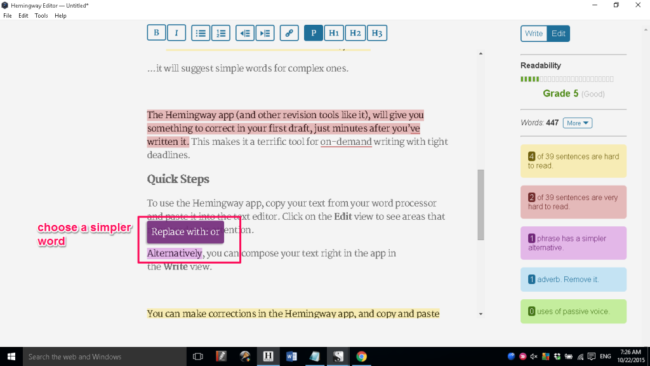Writing website content that ranks is undoubtedly a challenging task. As someone who has explored this topic extensively, I understand the ongoing quest to master the art.
However, by following a few essential rules, you can significantly enhance the ranking potential of your content.
In fact, these strategies can propel your content into the coveted realm of featured snippets, where your website claims the top spot when users search for businesses like yours.
Simplify and Engage:
To optimize your content for featured snippets, simplicity is key.
When writing for the web, favor concise, easy-to-understand sentences over complex language and industry jargon.
By adopting a conversational tone, your content becomes more approachable and comprehensible to both readers and search engines.
Utilize tools like Hemingway Editor to identify areas that require simplification, ensuring your words resonate with a wider audience.
Instead of using big words and complicated grammar, try writing in a simple, conversational tone.
This will help your website content read like a story, rather than a list or a paragraph of facts.

Tools like Hemmingway editor help you do just that. They highlight text that needs replacing and also prompt you to use simpler words instead of a complex word.
2. Use a clear CTA
Boost your content’s ranking potential by incorporating a clear CTA.
Engaging readers and encouraging their active participation elevates your authority in Google’s eyes.
Instead of using generic CTAs like “visit my website,” provide a glimpse of the value readers will gain.
For instance, opt for a more enticing approach such as “As a visitor to my website, you will uncover…”.
This way, you’re showing the reader how your content will benefit them, rather than just telling them what will happen.
Additionally, strategically use relevant images that complement your content and prompt users to take action.
Images help your content read like a story.

Try to make your images as relevant as possible to the topic being discussed.
Adding CTA through images is a nice way of capturing readers attention
3.Concise and Focused:
Given the tendency of readers to skim lengthy paragraphs, it’s crucial to stay focused on the point you want to convey.
Craft concise paragraphs consisting of two or three sentences to maintain reader interest and convey information effectively.
Avoid unnecessary wordiness that can hinder Google’s ability to rank your content.
Emphasize the importance of brevity while ensuring your points remain clear and impactful.
One of the biggest mistakes people make when writing content is taking too long to get to the point.
It’s tempting to write a lot of background information and explanations, but the best way to write content that ranks is to get to the point as quickly as possible.
If you don’t know where to begin, try starting with the most important points first
4. Meaningful Titles:
The title of your content is the first impression both search engines and visitors encounter.
Make it count by providing a clear and meaningful title that captures the essence of your content.
Aim for a length of 60 to 100 characters, keeping it concise and on point.
Avoid similarities with competitors’ titles to enhance your visibility and establish a unique identity.
Your title should effortlessly convey its message to both human readers and search algorithms.

Make sure that your title is relevant to your content and that it is unique by avoiding clashing with other words.
5. Keyword Optimization:
Keywords play a vital role in driving organic traffic to your website.
Incorporate them strategically by placing them at the beginning of your article and throughout its content.
Utilize keyword research tools like Ahrefs to identify relevant keywords, their search volume, and related phrases or questions.
This valuable information empowers you to align your content with user queries effectively, improving its discoverability.

A great way to avoid keyword stuffing is to make a list of high-level keywords relevant to the content of your website and then search for those keywords in the text of your content.
This helps make sure that your content’s focus is clear and it is potentially useful to search engines.
In Conclusion:
The best way to write content that ranks is to make sure that your content is relevant to the page, is clear, and uses keywords to optimize your content for search engines.
This will help your website content rank in both organic and paid search.
Use the 80/20 rule. When writing your content, focus on the top 20-30% of the copy, which are the most important, relevant, and valuable keywords and phrases for SEO.
Use the other 80% of the text for context and background information, but don’t go overboard.
Keep it simple. Keep your content brief, to the point, and free of clutter.
If you have a tendency to be verbose, go back and simplify your content.
If you’re unsure what to include in your content, do a quick Google search to see what content your competitors, and other relevant websites, are using.
This will help you decide what to write about, and what not to write about.
Be consistent.
Whether it’s the font, the sentence structure, or the tone, make sure that it’s the same across all of your marketing and sales materials.
If you try to be clever, your writing loses its impact and your audience grows confused.
Pingback: How to Use Keyword Research for SEO Success as a Blogger - contentwork.net
Pingback: How to choose images for website
Pingback: 5 principles of selling for successful sales - contentwork.net